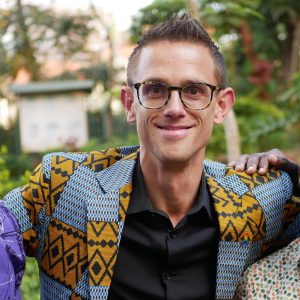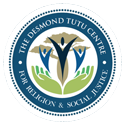 Describe your “connection” to the work and researchers of the DTCRSJ
Describe your “connection” to the work and researchers of the DTCRSJ
I have a long-standing connection to South Africa. In fact, I first met the DTCRSJ Director, Professor Sarojini Nadar, when I was a visiting student at UKZN where she was a lecturer at the time, back in 2006. I have stayed in touch with her ever since, and we have collaborated on quite a few projects. Our personal friendship and professional relationship developed into an official collaboration between the DTCRSJ and the Centre for Religion and Public Life at Leeds, with a Memorandum of Understanding in place since 2019, which I’m very excited about. In recent years, I have come to know many of the researchers and students in the DTCRSJ. It has been such a privilege to learn about the critical, important and transformative work taking place in the Centre, and now to be associated with the Centre!
What are your current research, teaching and academic service projects?
Much of my recent research has focused on Christianity and LGBTQ communities in East Africa. This culminated in my book Kenyan, Christian, Queer about the creative engagement with religion in LGBTQ activism in Kenya, which was published in 2019. Currently I’m completing another book, Sacred Queer Stories, co-authored with my Leeds colleague Professor Johanna Stiebert; it is based on a project where we worked with Ugandan LGBTQ refugees, creatively using bible stories to narrate and signify their life experiences. I’m also finishing a book with another longstanding collaborator, Professor Ezra Chitando from the University of Zimbabwe, titled Reimagining Christianity and Sexual Diversity in Africa.
Having worked on LGBTQ issues for a while, I’m currently developing a new area of research, about the way in which African literary writing represents, critiques and reimagines popular forms of Christianity on the continent. I love reading novels, so why not making it part of my work?!
My teaching at Leeds is quite closely connected to my research interests and activity, which enables a great cross-fertilisation. So does my involvement in the two just-mentioned research centres at Leeds, which are stimulating platforms for interdisciplinary collaboration.
How do you plan to use your new position to enhance research, teaching, and academic service between the Centre and your networks?
I hope that the already existing collaboration between the Desmond Tutu Centre and the Leeds Centre for Religion and Public Life will be strengthened by my appointment in the Centre. Part of the Memorandum of Understanding between the two centres concerns collaboration in terms of postgraduate student supervision and exchange. I would very much welcome students from Cape Town to spend time as visiting students in Leeds, and vice versa, and am happy to facilitate that where I can. In fact we’ve already made some beginning with that last year. I’ve also attended and contributed to some of the postgraduate cohort workshops in the Centre, and have been impressed by the collaborative model of supervision. I hope to be able to contribute more to this in the future, and possibly also to co-supervise students in the Centre with projects adjacent to my expertise. I already have collaborated extensively with Professor Nadar on research and publishing projects in the past, and am also in conversation with Dr Jodamus, Dr Robertson and Dr Scharnick-Udemans with whom I have shared research interests. I’m excited to further develop these opportunities for research collaboration, also including colleagues in other parts of the continent that I work with.
In what way (s) do you feel your research examines the intersections of and overlaps between religion and social justice?
The underlying question in much, if not all of my research is how religion is part of processes of progressive social change, sometimes as a hindrance, sometimes as a resource, and often these two are combined in complex ways. My research has engaged with issues of HIV/AIDS, gender, sexuality, and more recently ecology, the common thread being an interest in, commitment to, social justice in each of these areas. Where some colleagues focus on developing constructive projects that articulate theological visions for “another world possible”, my work tends to be empirically based – taking it’s starting point in what specific religious communities actually do, and how particular religious discourses, beliefs and practices operate. Doing so, I tend to foreground relatively marginal perspectives, in order to debunk and challenge monolithic narratives. For instance, in my book Kenyan Christian Queer, I present an ethnographic case study of a Nairobi-based LGBTQ church. Yes, this church is small and numerically it may be insignificant. But its very existence counters the idea that Kenyan Christianity is inherently homophobic. It presents an alternative possibility, a space of hope.
What advice can you offer post-graduate students and emerging scholars?
It’s only ten years ago that I completed my PhD thesis, and sometimes I still feel like an ‘emerging scholar’ myself (although recognising that I have the privilege of being in a secure academic position). I think the most important advice is to stay close to your passion. Academia shapes you in a certain way – it makes you think, talk and write in a certain way – which is fine, it’s part of the training. But you can only stay motivated – or at least, I can – when you work on issues that you really care about, and when you develop your own style and voice rather than try to mirror others. This has taken me a while, honestly, and it still is a journey.
Closing remarks
The only thing I want to add is a big thank you for welcoming me in the Centre. It’s such a huge privilege to be associated with a vibrant and warm academic community that is truly committed to transformative scholarship of a high standard. I’m truly grateful for the opportunity, and I hope to make it worth it. The news of my appointment was one of the most exciting things to happen in a period that otherwise has been rather grim. I can’t wait to visit and catch up with you all in Cape Town, when this global pandemic will finally allow us to.
